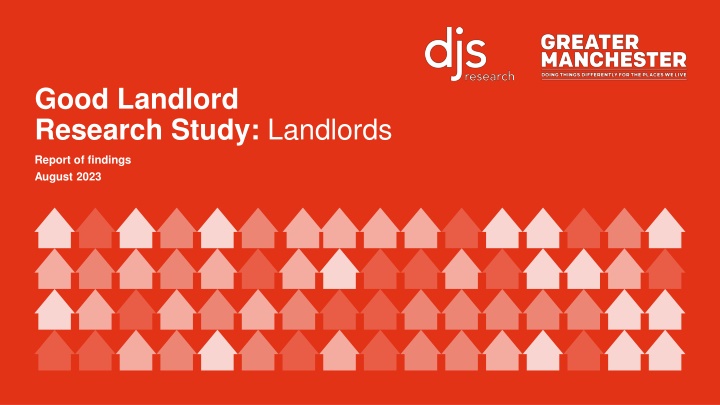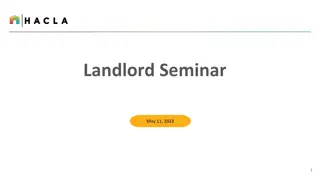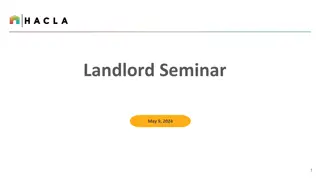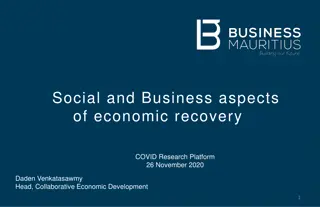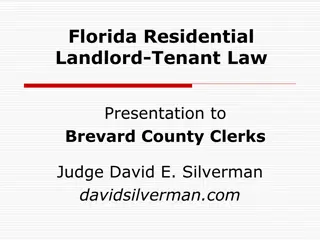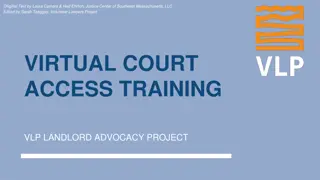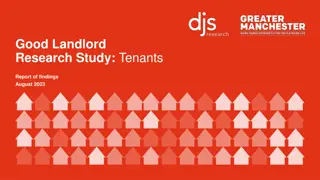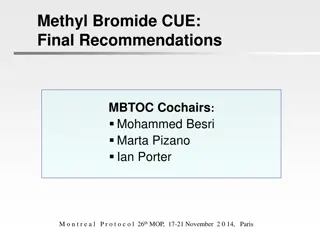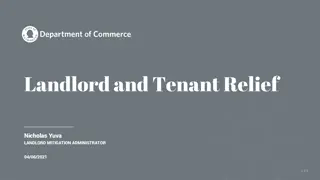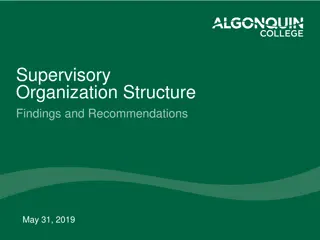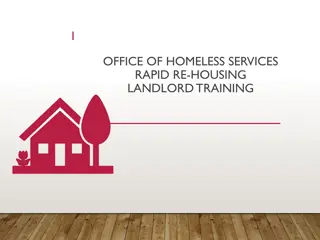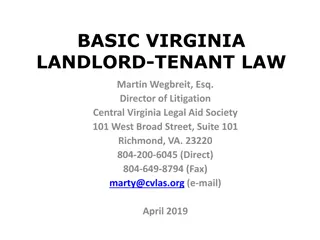Good Landlord Research Study: Findings and Recommendations August 2023
This research study conducted in Greater Manchester aimed to understand the experiences of private landlords in the rental sector. The study identified landlord characteristics, explored motivations and challenges related to property renting, and looked into ways to improve the private renting sector. The survey methodology involved a mix of online and offline methods to recruit a sample of 355 landlords. The report provides insights on landlord experiences, finances, motivations, tenant search, property management, and overall satisfaction.
Download Presentation

Please find below an Image/Link to download the presentation.
The content on the website is provided AS IS for your information and personal use only. It may not be sold, licensed, or shared on other websites without obtaining consent from the author.If you encounter any issues during the download, it is possible that the publisher has removed the file from their server.
You are allowed to download the files provided on this website for personal or commercial use, subject to the condition that they are used lawfully. All files are the property of their respective owners.
The content on the website is provided AS IS for your information and personal use only. It may not be sold, licensed, or shared on other websites without obtaining consent from the author.
E N D
Presentation Transcript
Good Landlord Research Study: Landlords Report of findings August 2023 1
Contents 3 Background & objectives 4-5 Methodology & reporting 6-10 Summary & recommendations Main Findings 11 - 18 Landlord characteristics 19 - 23 Finances & rent 24 - 31 Motivations & experience 32 - 36 Looking for tenants 37 - 40 Property management 41 43 Overall satisfaction 44 - 49 What is a good landlord? 2
Background & objectives To inform the development of a new Good Landlord Charter GMCA wanted to survey private landlords in Greater Manchester to understand their experiences of letting out a property in the private rented sector (PRS). The main objectives of the research are to: Identify the characteristics of landlords in Greater Manchester (GM) Explore the motives and aspirations of landlords Understand experiences of letting properties Assess challenges in relation to cost of living in the private rented sector Explore how private renting can be improved 3
Methodology The survey questionnaire for landlords was designed by DJS Research, in collaboration with GMCA, covering the topics listed in the appendix. A mix of online and offline research methods were used to recruit landlords from Greater Manchester (GM) to the survey, to help maximise response rates and ensure the survey was as inclusive as possible. This involved a mix of telephone interviews, an online survey promoted via social media and GMCA networks, as well as landlords recruited via an online panel. As there is no accurate population/universe data available to determine what a representative sample of landlords in Greater Manchester looks like, the aim was to achieve a large sample of GM landlords to provide a flavour of the landlord experience, rather than a sample that was fully representative of all landlords in the area. In total a sample of 355 landlords was achieved; this included 293 landlords recruited via online panels and 63 via telephone interview, social media or GMCA networks. Fieldwork started on 17th March 2023. All fieldwork paused from 27th March until 5th May due to local elections. Fieldwork then continued until 11th June. 4
Reporting note In addition to this report a full set of cross tabulations is available providing the data for landlords. The tables show the breakdown of responses for each question in the survey in total, and for key sub-groups or cross-breaks i.e. by key demographic and other survey variables (e.g. age, gender, number and location of properties, overall satisfaction with being a landlord). In this report we have reported by exception, highlighting particularly large (statistically significant) differences worth noting. This does not mean there are no other sub-groups that provided significantly different responses, but due to the volume of sub-groups it is not possible to include them all in this report. An anonymised raw data file is also available and a separate file containing the details of those who consented to being re-contacted for further research. In the cross tabulations all statistically significant differences (at 95% level) responses are highlighted between sub-groups of the sample (e.g. number of properties or age group) compared with all landlords on average, and between those in the same cross-break (e.g. males vs females in the gender cross-break). Where figures in charts/tables do not total 100% this will be due to rounding or a minority of respondents providing a response of don t know or prefer not to say. As mentioned on the previous page, as we were not aiming to achieve a fully representative sample and do not have figures of the universe of GM landlords to be able to weight the data, so that it is fully representative, the findings throughout this report should be treated with some caution. 5
Summary 6
Summary (I) Landlord Characteristics 6 in 10 of landlords fully manage their properties, 3 in 10 partly manage them with a letting agent and just over 1 in 10 have properties fully managed by letting agents. The findings from this survey of 355 landlords with properties in GM that they rent out privately has indicated the following characteristics: GM landlords are more equally balanced in terms of gender (47% male/51% female) than perhaps anticipated and younger (34% aged 18-34; 35% are 35-44). Just 2 in 10 became landlords as a full-time business, for 7 in 10 it was for investment purposes, including 4 in 10 that became landlords for additional income vs. 2 in 10 that did so for their pension. 6 in 10 of landlords only own rental properties within GM only, not elsewhere. In total, including any properties owned outside of GM) more than 7 in 10 own multiple rental properties, including 3 in 10 that own 5+ properties. Cluster analysis has revealed 5 distinct groups of landlords: Small self-managed - high confidence/compliance, Small self-managed - low confidence/compliance, Small portfolio - not hands on, Large personally managed hands on, Large business concern. The vast majority of landlords own properties in their own name as an individual, just 16% own properties as part of a business of which they have significant control. 7
Summary (II) Management of tenants and repairs Almost 8 in 10 landlords claim they would seek to fix a boiler within 3 days, although this leaves 1 in 5 landlords likely to leave tenants waiting more than 3 days without heating/hot water. 6 in 10 landlords expect damp issues to take 3+ days resolve. Over half of landlords have had tenants go into arrears in the last 5 years. When asked what they would do if a tenant went into arrears, half of landlords say they would set up a payment plan, while 1 in 4 would not renew their tenancy and nearly 1 in 5 would seek to evict the tenants. Tenants sought by landlords are most typically families and people in employment. Just 1 in 10 landlords say they typically let to local authority placements or other public sector placements (e.g. refuges or asylum seekers). A similar proportion (12%) let to tenants in receipt of welfare benefits. When prompted with a list, tenant behaviour comes top as the most common concern for landlords. However, cost of repairs/maintenance and financial concerns due to rent arrears are also high on the list. Financial concerns linked to mortgage repayments or the cost of finance are within the top 3 concerns for 1 in 4 landlords. Only 7% of landlords say there is no particular group of tenants they target. Around half of landlords surveyed say they have evicted a tenant or asked them to leave in the last 5 years. The most common reasons for doing so are for causing damage to the property or not being a reliable payer of rent. 8
Summary (III) Landlord credentials, confidence and compliance Almost 8 in 10 landlords feel confident they can deal with a tenant needing extra support for a disability and slightly fewer feel able to deal with a tenant needing financial help; at least 1 in 5 would not feel confident supporting tenants with these additional needs. Most landlords from the survey (which was not meant to be fully representative of all GM landlords) say they feel confident in their abilities and quite high proportions claim they have become licensed, accredited or have undertaken training. However, it is likely that some respondents will be over-claiming if they do not wish to reveal they re not sure of their responsibilities. Most landlords (9 in 10) feel confident that they are legally compliant in all areas. However, the proportion very confident is lowest with regards to licensing and at least 1 in 5 are only fairly confident rather than very in each area of compliance. 3 in 5 landlords say they have become a licensed landlord, though there may be some misunderstanding as to what this means. Just under half of landlords say they have joined a landlord trade body or undertook landlord training, and just over 2 in 5 say they have attended a local landlord forum or become an accredited landlord. 9
Summary (IIII) When landlords were asked what they think makes a good landlord, they prioritise being understanding, having a good character and providing good standards. Unlike tenants, for landlords good communication is not top of mind as being high on the list of priorities. Affordability is not mentioned and a significant proportion (44%) chose not to comment. Meeting tenants needs and overall satisfaction with being a landlord Most landlords (9 in 10) are keen to improve their properties to attract new tenants and retain existing ones Re-decorating is most common for attracting new tenants. 1 in 7 landlords say they have gained accreditation to help attract new tenants. To keep existing tenants, landlords are most likely to have made sure requests for repairs are resolved quickly or not increased the rent (around 2 in 5 in each case). Overall, 9 in 10 landlords survey are satisfied with being a private landlord 10
Summary (V) Committing to standards and a Good Landlord Charter Views are quite mixed in terms of landlords interest in joining a good landlord charter, based on the description provided, although 2 in 3 landlords are either positive or neutral/think they need more information. Based on the following description: Andy Burnham, the Mayor of Greater Manchester, has committed to developing a Good Landlord Charter, which will be a new form of landlord accreditation 2 in 5 (39%) landlords express some interest in joining the charter, 1 in 3 (33%) say they are not interested and slightly fewer (28%) are not sure or need more information. Half of landlords do not currently go beyond meeting legal requirements and do not think it is their job to do so. A quarter are open to doing this but are not currently. This leaves just over 1 in 10 (13%) landlords currently going beyond legal requirements and 12% who are not sure. When asked which examples of best practice landlords would be willing to commit to doing the highest proportion, of over a third, would commit to giving tenants time if struggling to pay rent. Landlords are least willing to give tenants the power to stay as long as they want (fewer than 1 in 5). 11
Landlord profile Private landlords in GM that responded to the survey are more equally balanced in terms of gender than perhaps anticipated and younger. Around 6 in 10 (61%) are aged 25-44 years. There is an almost even split by gender and 1 in 4 are from ethnic minority groups. Age Disability Gender Yes have a disability 14% 18-24 Man 47% 8% No don t have a disability 84% Woman 51% 25-34 26% Sexual orientation Ethnicity Bisexual 4% Asian/Asian British 13% 35-44 35% Gay or lesbian 5% Black/Black British 3% Heterosexual or straight 86% 45-54 17% Mixed 6% White 75% 55-64 11% 65+ 3% (All landlords: 355). 13
Landlord portfolio (I) The survey covered landlords with properties across all ten GM districts; half have properties in the Manchester district. Around 6 in 10 own more than one rental property in GM and a similar proportion only own rental properties within GM (not elsewhere). In total, 72% have multiple properties, with more than 1 in 10 (14%) that own 10+ rental properties. Location of properties Total size of portfolio Number of properties in GM Bolton 15% 14%: 10+ Only one 37% Bury 9% 28% Only one 2-4 42% Manchester 53% 5-9 13% Oldham 10% 10+ 7% 17%: 5 - 9 Rochdale 9% Other rental properties elsewhere? Salford 14% No 61% Stockport 11% 41%: 2 4 Yes - others in the North West of England 26% Tameside 9% Yes elsewhere in the UK (outside the North West) 9% Only one 5 - 9 10+ 2 4 Trafford 9% Wigan 12% Yes abroad/overseas 5% Q01B. In which of the ten local authority areas within GM do you own rental properties? Q01. How many rental properties, rented out to private tenants do you currently own in GM? Q2. Apart from the rental properties in GM, do you own any other residential properties that are rented out to private tenants either in the North West of England, the rest of the UK or abroad? Q03. Excluding those in GM, how many other rental properties that are rented out to private tenants do you own? (All landlords: 355) 14
Landlord portfolio (II) The survey suggests that terraced houses are the most common type of property owned by landlords in GM, with 2 in 3 owning at least some and for 1 in 4 landlords all their properties are terraced. Property types All Some None Prefer not to say Terraced houses 26% 40% 33% Semi-detached houses 13% 35% 50% Detached houses 3% 21% 74% Apartment/flat or maisonette 8% 28% 61% Bungalow 10% 87% HMO, including bedsit 2% 12% 83% Room in a house where you live 2% 8% 87% Available for short-term let (e.g. AirBnB) 4% 17% 77% Q05. Are all, some or none of the rental properties you own ? (All landlords: 355). 15
Landlord portfolio (III) Just 11% of landlords say all their properties are new-builds (built in the last 20 years) and 15% only own properties built before 1950. Property Age All Some None Prefer not to say Property built within the last 20 years 68% 11% 18% 3% Property built before 1950 58% 15% 23% 4% Q05. Are all, some or none of the rental properties you own ? (All landlords: 355). 16
Property ownership Most landlords from the survey own their property in their own name, while 16% are part of a property business of which they have significant control. In half of cases landlords are the sole owners of their property/business. Number of people that own the properties/are in their property business Property ownership In my own name as an individual (either on your own or with others) 83% Just me 51% By a company of which I have significant control 16% 2 people 30% 3-5 people 15% Owned by a company of which I am 5% an employee 6-10 people 2% Owned by a charity/not for profit organisation of which I am an 2% employee 11-49 people 2% Other/don't know 2% 50+ people 1% Q09. How is/are your current rental property/properties generally managed? (All landlords: 355). 17
Who manages the property 3 in 5 landlords say they fully manage their properties themselves. This is more likely to be the case where landlords originally became a landlord as a full-time business and less likely where properties are owned by a company/organisation rather than by an individual. 61% 27% 14% 4% 1% 1% Fully managed (directly) by you/the landlord(s) Partly by a letting agent (e.g. to find the tenants) and partly by you/the landlord(s) e.g. for repairs Fully let and managed by an agent Fully leased to a local authority Fully leased to another landlord Other Reasons for being landlord: full time business Reasons for being landlord: investment Reasons for being landlord: home for others Reasons for being landlord: accidental Property ownership: as individual Property ownership: not as individual Fully by landlord 65% 42% 59% 55% 59% 78% Part letting agent/part landlord 25% 39% 22% 29% 32% 22% Fully by agent 13% 19% 8% 15% 16% 24% Q09. How is/are your current rental property/properties generally managed? (All landlords: 355). 18
Landlord cluster analysis Using key landlord profile questions cluster analysis was conducted to group the landlords into clusters/ segments so that they are as similar as possible within each group, but as different as possible between the groups. 5 key groups were identified: 28% Small self-managed - high confidence/compliance: likely to rent 2-4 properties they mostly find maintain the properties themselves & deal with problems directly being a landlord is a job/investment & tend to own the properties themselves. Understand the rules/laws and are confident that they know how to handle tenants they have already made steps to improve themselves as landlord, such as joining forums/training/accreditation 12% Large personally managed hands on: Larger portfolio 5+ properties. The properties they manage are mostly in their own name and they would say that this is their job rather than an investment Get hands-on with the maintenance and deal directly with tenants 25% Small self-managed - low confidence/compliance: As above they have a small portfolio (maybe just one property) which they deal with themselves but have lower confidence in knowing the legal requirements/how to handle tenants and are unlikely to have sought support and help to them be a better landlord 10% Large business concern: Own multiple properties but tend to be owned by a company/organisation than landlord directly. Managed either fully or partially by an agent/charity rather than landlord. 25% Small portfolio - not hands on: Also have small portfolio but are much less hands-on, letting an agent deal with the day-to-day running and not getting too involved in repairs etc. (All landlords: 355). 19
Rent increases The approach to rent increases varies among landlords in the survey, with response split quite evenly between landlords who increase rent when they need to charge more, and those who do so annually or at the start of a fixed contract. How often landlords increase rent Within the When I need to charge more category it s particularly high among: When I need to charge more (i.e. due to 28% increased costs) Annually 25% Landlords who frequently sell and buy property, but portfolio stays around the same size (45%) & where property is owned by a company (45%) At the start of any new fixed term contract 22% When I re-let the property 11% Within the Annually category it s particularly high among: If the rent falls behind the market 6% Respondents who became landlords as a full-time business (36%). Never 5% Q25. In general, how often do you increase the rent on your properties? (All landlords: 355). 21
Landlord finances A fifth of landlords that took part in the survey say they own their properties outright. Nearly half say they have a loan to value ratio up to 50%. While around 1 in 4 have a loan to value ratio of over 50%. 6 in 10 (59%) find it easy or very easy to cover all costs of letting property/properties, just 7% say it is difficult, although for a third it varies. Approximate/average loan to value ratio on rental property/properties 26% 20% 20% 19% 5% 5% 4% 1% 0% No Up to 25% on a mortgage/loan 26-50% 51-75% 76-90% 91-100% More than 100%/negative equity Prefer not to say Don t know mortgage/owned outright Ease of covering all costs of letting property/properties 2% 5% 34% 36% 23% Very difficult Difficult Varies Easy Very easy Within the Very difficult at all and Difficult selections (totalling 7%) it s particularly high among: Landlords planning to downsize portfolio (21%)* Asian/Asian British (19%) All properties built before 1950 (15%) Those dissatisfied with being a landlord (31%)* Q30. What is the approximate/average loan to value ratio on your rental property/properties? (All landlords: 355) Q29. How easy or difficult do you find it to cover all the costs of letting your property/properties? (All landlords: 355). *Low base (under 50). 22
Rent arrears Over half of landlords surveyed report that they have had tenants go into arrears in the last 5 years. Around half would set up a payment plan in response, while 1 in 4 would offer a period rent free or signpost them to support sources. However, just slightly fewer would not renew their tenancy and almost 1 in 5 would seek to evict them. Have you had any tenants go into arrears in last five years What landlords would do in response to tenants who go into arrears Within the Set up a payment plan category it s particularly high among: Set up a payment plan 49% Offer a period rent free e.g. if they had temporarily lost their job 25% Landlord for more than 10 years (64%) Very confident they fully understand responsibilities as landlord (60%) Go above & beyond legal requirements (71%) 21% Signpost them to sources of support e.g. Local 25% Authority, CAB 2% 43% Not renew their tenancy 23% Seek direct payments from Universal Credit 21% 34% Seek to evict them 17% Within the Seek to evict them category it s particularly high among: Other 3% Yes, several times No Yes, once or twice Prefer not to say 9% Don t know Those not interested in being accredited (29%) Q26. Have you had any tenants who have gone into arrears in the last five years? (All landlords: 355) Q27. Which of the following would you do in response to tenants who go into arrears with their rent? (All landlords: 355). 23
Landlord concerns What causes landlords most concern Tenant behaviour e.g. property damage, 45% behaviour When prompted with a list, tenant behaviour comes top as the most common concern for landlords. However, cost of repairs/ maintenance and financial concerns due to rent arrears are also high on the list. Cost of repairs or other day to day running costs 35% Financial concerns due to rent arrears 34% Legislative changes/keeping up with legal 29% requirements Financial concerns linked to mortgage repayments or the cost of finance 26% Financial concerns linked to mortgage repayments or the cost of finance also feature in the top 3 concerns for 1 in 4 landlords. The quality of the service offered by my letting 18% agent Tenant turnover / voids /empty property 18% Nothing in particular 7% Something else 1% Q28. Which of the following causes you most concern as a landlord? You can select up to three (All landlords: 355). 24
Landlord experience The length of experience that landlords have varies, but most are planning to stay landlords for the long term. Length of time as private landlord Employment status 6-11 months 8% Employed/self-employed full time 72% 1-2 years 21% Employed/self-employed part time 15% 3-5 years 36% Not in work 11% 6-10 years 20% Nearly 3 in 4 landlords from the survey work full time, although as we see on the next page only 20% originally became a landlord as a full-time business, so it s likely that the majority work elsewhere in addition to owning property. More than 10 years 16% Length of time planning to be a private landlord 1-2 years 10% 3-5 years 20% 6-10 years 15% More than 10 years 41% 14% Don t know S04. How long been a private landlord? S05. And for how much longer do you plan on being a private landlord? C04. Employment status. Q24. And which of the following best describe your plans for the number of rental properties you own? (All landlords: 355). 26
Reasons for becoming a landlord 1 in 5 cite they originally became a landlord as a full-time business, although the likelihood of this increases with the total size of their portfolio, as one would expect. Nearly 3 in 4 (72%) became landlords for investment purposes and more so as extra income, than for their pension. Total portfolio size vs. reasons for becoming a landlord As a full-time business 20% An investment - for capital growth 29% Investment: Total portfolio size: Only one 72% 2-4 5-9 10+ An investment - for additional income 43% An investment as part of my pension 22% Full-time business 10% 18% 31 % 38% To provide a home for a family member or friend 8% Home for others: 11% To provide a home for an employee 3% Investment 63% 68 % 71% 82% An inheritance 8% Accidental: 14% Managed a property for a family member 4% Home for others 10% 6% 20 % 15% You were unable to sell a home you owned 3% Other 2% Accidental 18% 12% 10% 21% 1% Don t know Q08. What is the main reason you or the business you work for originally became a landlord? (All landlords: 355). 27
Future intentions The majority of landlords expect their property portfolio to remain the same size, with 7% expecting to downsize and 1 in 6 that expect to grow their portfolio. Within the Sticking with my current portfolio category it s particularly high among: Within the Downsizing my portfolio category it s particularly high among: Sticking with my current portfolio 49% Frequently selling and buying property, but this is business as usual/It generally stays around Own 1 property in total (69%) All properties are houses (63%) Aged 55+ (22%) Those neutral or dissatisfied with being a landlord (28%)* 18% the same size Downsizing my portfolio 7% Within the Frequently selling and buying property category it s particularly high among: Within the Growing my portfolio category it s particularly high among: Growing my portfolio 16% Aged 18-34 years (32%) Asian/Black/Mixed ethnicity (30%) Own multiple properties (23%) Those with properties in Salford (31%) Those who let to young professionals (24%) Not sure what my plans are 10% Q24. And which of the following best describe your plans for the number of rental properties you own? (All landlords: 355). 28
Confidence as landlord Most landlords surveyed (93%) say they feel confident that they understand their responsibilities, although there may be some over-claim with landlords not wanting to appear unconfident or non-compliant. Almost 8 in 10 feel confident they can deal with a tenant needing extra support for a disability and slightly fewer (73%) would be able to deal with a tenant needing financial help. However, at least 1 in 5 would not feel confident supporting tenants with these needs. Within the Not at all and Not very selections for You fully understand your responsibilities as a landlord it s particularly high among: Frequently selling and buying, but portfolio size remains the same (20%) Asian/Black/Mixed ethnicity (18%) Own 10+ properties (17%) Extent landlords feel confident in 93% You fully understand your responsibilities as a landlord 6% 29% 64% Within the Not at all and Not very selections for You are able to deal with a tenant that needs financial help it s particularly high among: 78% You are able to deal with a tenant that needs extra support for a disability 4% 19% 36% 42% Aged 55+ (49%) Property fully managed by letting agent (41%) Properties/property in Salford (42%) Have a disability (41%) Neutral/dissatisfied with being a landlord (52%)* 74% You are able to deal with a tenant that needs financial help 6% 20% 34% 39% Not at all Not very Fairly Very Q18. To what extent do you feel confident ? (All landlords providing a response: bases vary). *Low base (under 50). 29
Confidence in legal compliance Most landlords are very or fairly confident they are legally compliant in all areas. The proportion very confident is lowest with regards to licensing. Typically give tenants a written tenancy or contract Extent landlords are confident they are legally compliant in Gas safety checks 4% 21% 73% 4% Property free from hazards / fit for human 6% 24% 69% habitation Virtually all (96%) also say they typically give tenants a written tenancy or contract. Smoke and carbon monoxide alarms 7% 22% 70% Tax in relation to your rental 9% 25% 65% 96% income/properties However, once again there may be some over- claim and at least a fifth are only fairly confident in each area, than very . Electrical safety Yes No 9% 20% 68% checks Property licensing (e.g. HMO licensing) 9% 28% 60% Not at all Not very Fairly Very Q19. How confident are you that you are legally compliant with each of the following? (All landlords providing a response: bases very) Q20. Do you typically give your tenants a written tenancy agreement or contract? (All landlords: 355). 30
Actions taken by landlords Which of the following landlords have done since becoming a landlord Within the Become an accredited landlord category it s particularly high among: Become a licensed landlord 60% 3 in 5 landlords say they have become a licensed landlord, though there may be some misunderstanding as to what this means and it does need to be remembered that the sample may not be fully representative of all GM landlords. Joined a landlord trade body 10+ properties in total portfolio (62%)* Became a landlord for full time business (62%) Students as tenants (62%) 5+ properties in GM (61%) Aged 18-34 years (56%) Very satisfied with being a landlord (55%) 47% (e.g. NRLA) Undertaken landlord training 46% Attended a local landlord forum 43% Just under half say they have joined a landlord trade body or undertook landlord training. Become an accredited landlord 43% Just over 2 in 5 have attended a local landlord forum or become an accredited landlord. Approached the local authority to support you with managing a tenancy dispute 35% Q21. Which of the following have you done since becoming a landlord? (All landlords providing a response: bases vary) *Low base (under 50). 31
Which of the following landlords have done since becoming a landlord Sources of information used Landlords who plan to grow their portfolio are more likely to source their information from letting agents (54%), general internet searches (49%) or social media groups (46%) when compared to the total. Letting agents 41% Letting agents are the most common other source of information for landlords. While around 1 in 3 rely on a range of other sources including general internet searches, social media and the Government How to let guide. Government websites 35% General internet searches/Google Within the Friends/family category it s particularly high among: 34% Friends/family 31% Landlords with one (31%) or 2-4 (40%) properties in total, compared to landlords with 10+ properties (13%). Social media groups 31% 30% Government How to let guide Accreditation membership websites e.g. NRLA website Within the Accreditation membership websites category it s particularly high among: 21% Those looking to grow their portfolio are more likely to be seeking information. Other media TV, radio, 16% newspaper Those with 10+ properties in Greater Manchester (46%)* or 10+ in total (33%)* Those willing to go above and beyond the legal minimum (38%) Other 3% None 8% Q22. What other sources of information or organisations, if any, have you used or approached for information or advice on managing your rental properties? (All landlords: 355) *Low base (under 50). 32
Types of tenants Types of tenants landlords let to Families with children Within the People in receipt of welfare benefits category it s particularly high among: 46% The survey suggest tenants sought by landlords are most typically families and people in employment. People in employment 42% Young professionals 35% 5-9 properties in total portfolio (22%) Adults with no children 34% Just 1 in 10 landlords say they typically let to local authority placements or other public sector placements. A similar proportion (12%) let to tenants in receipt of welfare benefits. Within the Local Authority placements and Other public sector placements categories (totalling 10%) it s particularly high among: Single people 28% People aged 55+ 19% Students 16% With property in Tameside (34%) or Manchester (15%) 5-9 properties in total portfolio (20%) Own property not as an individual (20%) Frequently selling and buying property, generally stays around same size (18%) People in receipt of welfare benefits 12% Local Authority placements 7% Just 7% of landlords target no particular group of tenants. Other public sector placements e.g. refugees, asylum seekers 3% No particular group 7% Q10. What type of tenants do you typically let to? (All landlords: 355). 34
Actions taken to attract new tenants Nine in ten (91%) landlords surveyed say they have taken action to help attract new tenants. Re-decorating is most common. 1 in 7 landlords say they have gained accreditation to help attract new tenants. Re-decorated 52% Within the Gained landlord accreditation category it s particularly high among: Fitted a new kitchen or bathroom 41% Been flexible about the length of tenancy offered 37% 10+ properties in GM (35%) or 10+ properties in total (31%) Landlords with property in Wigan (27%)* Became landlord as a full-time business (25%) Landlords with student tenants (29%) Frequently selling and buying property, generally stays the same size (25%) Believe landlords should go above and beyond legal requirement (31%) Already accredited but open to joining charter (26%) Improved the energy efficiency of the property 33% Fitted security features such as alarms or CCTV 28% Alterations to the building e.g. added an extra bathroom, bedroom or knocked down walls to create a larger kitchen/diner Offered the property at a lower rent than I believe I could have 25% 23% achieved Advertised it targeting particular types of tenants (e.g. students, 17% tenants on benefits) Gained landlord accreditation 14% Joined a landlord trade body 13% Something else 1% Nothing in particular have found it easy to attract tenants without taking any specific actions 7% Q11. Which of the following, if any, have you done to help attract new tenants? (All landlords: 355) *Low base (under 50). 35
Important factors when looking for a tenant When asked to rate a range of factors, ability to pay rent is highlighted as the most important factor when landlords are looking for a new tenant, followed by passing reference checks. Ability to pay the rent 7% 14% 76% 3% 90% Within the They are not claiming benefits category: NET important particularly high among: Passing reference checks 5% 84% 11% 27% 57% They are in full time employment 14% 41% 39% 6% 79% The length of tenancy they are looking 19% 50% 24% 6% 75% for They do not smoke 23% 28% 38% 10% 66% Longer serving private landlords (More than 10 years, 71%) Landlords who don t feel they should go above and beyond legal requirements (58%) They are someone you think you will 25% 35% 30% 10% 65% get on with They are all from the same family unit i.e. not house-sharers 23% 30% 33% 14% 64% They are not too young/students 27% 37% 19% 17% 56% They do not have pets 27% 28% 24% 21% 52% They are not claiming benefits 30% 28% 24% 18% 52% They do not have children 30% 14% 15% 41% 29% Not at all important Not very important Fairly important Very important Very/fairly important % Q12. How important are the following factors when looking for a new tenant? (All landlords providing a response: bases vary.) 36
Methods used to advertise Almost half (48%) of landlords that participated in the survey advertise property on an online property portal, with 6 in 10 using some form of online method. Almost 4 in 10 (38%) say they use a lettings agent. Online property portal (e.g. RightMove, Zoopla, OpenRent, SpareRoom) 48% 62% of landlords advertise property online at all. This figure is lower among: Aged 55+ (47%) Not in full or part time work (28%) Been a private landlord or 10+ years (43%) Became a landlord to provide a home for others (39%) Those not confident they fully understand responsibilities as a landlord (33%) Those downsizing their portfolio (38%) Directly with a lettings agent 38% Social Media or listings site (e.g Facebook, 35% Gumtree) Friends and family 26% Word of mouth 24% Local advert (e.g. newspaper, shop) 17% University accommodation listings 12% Council or other public body place tenants 10% Short-term listings (e.g. AirBnB) 9% Landlords with property in Rochdale are notably more likely than the total to advertise via word of mouth (45%) or through friends and family (52%). None/ have no need to advertise 2% Other 2% 1% Don t know Q13. Which methods do you mainly use to advertise your property/properties? (All landlords: 355). 37
Speed of repairs Almost 8 in 10 (78%) landlords claim they would seek to fix a boiler within 3 days, although this leaves 1 in 5 who are likely to leave tenants waiting more than 3 days without heating/hot water. 6 in 10 (58%) expect damp issues to take 3+ days resolve. Broken boiler/heating/hot water 23% 11% 5% 55% 4% 22% Within the Penetrating or rising damp category it s more likely among: Aged 55+ years (76%) All properties were built before 1950 s (70%) Unsecure external door or ground 16% 12% 7% 59% 4% 24% floor window A hole in a wall allowing pests in 29% 21% 5% 39% 3% 31% Broken bannisters / stairs / floor 32% 25% 10% 25% 4% 3% 43% boards Broken white goods provided at the start of the tenancy 35% 33% 5% 21% 3% 3% 43% Penetrating or rising damp 26% 26% 17% 17% 8% 7% 58% Within 24 hours Within a month Within 2-3 days Longer than a month Within a week More than 3 days (%) Within a couple of weeks Q14. How quickly would you typically seek to resolve the following problems in your property, on receipt of a complaint from your tenant? (All landlords providing a response: bases vary). 39
Evicting tenants Evicted or asked a tenant to leave in the last 5 years Around half (51%) of landlords from the survey say they have either evicted a tenant or asked them to leave in the last 5 years for at least one of the reasons indicated. More likely among: Landlords not confident they fully understand responsibilities (96%)* Landlords not confident they are legally compliant with property being free from hazards/fit for habitation (91%)* Have a disability (71%)* Property in Tameside (72%), Stockport (69%) or Manchester (61%) 10+ properties in total portfolio (81%) Own the property not as an individual (80%) Tenants are from Local Authority or other placements (79%)* For causing damage/not looking after 18% the property Because they weren't a reliable payer 17% 51% Yes Because they were in rent arrears 15% For anti-social behaviour 13% Because you believed you could relet the property at a higher rent The most common reasons are for causing damage to the property (18%) or not being a reliable payer of rent (17%). 12% Because you wanted to sell the 9% property For another reason 2% No 49% Q15. In the last 5 years, have you evicted or asked a tenant to leave for any of the following reasons? (All landlords: 355) *Low base (under 50). 40
Actions taken to keep tenants Most (88%) landlords say they have taken some action to keep existing tenants. Quickly resolving repairs (39%) and not increasing the rent (37%) are most common. Among those who haven t taken any action, the most common reasons for this is that they can easily find new tenants (38%), or they don t feel any action is needed or they are confident tenants will stay (33%). Reasons why actions are not taken Made sure requests for repairs were quickly resolved 39% Actions taken to encourage existing tenants to stay in property Not increased the rent 37% Don t mind if they leave/can easily get new tenants 38% Accepted requests from tenants to make changes to the property (e.g. allowed them to redecorate) 31% Don t feel any are needed/am confident they will stay anyway Redecorated the property 27% 33% Installed a new boiler 25% Don t think my actions will make any difference to their 21% Offered them a long-term tenancy (e.g. 2 years+) 24% Improved energy efficiency / EPC rating 21% Leave it to letting agent to do what s needed 21% Fitted security / CCTV at tenant's request 15% Don t want to keep my existing tenants Offered to cut the rent 14% 7% Made adaptations to make a property accessible for someone with a disability (e.g. grab rails, level access shower) 14% Something else 2% Something else 2% No particular action has been taken to try and keep tenants 12% Q16. Have you taken any of the following actions to encourage or help your existing tenants stay in your property/properties? (All landlords: 355) Q17. Why do you not take any actions to try and encourage existing tenants to stay in your property/properties? (All landlords: 42). 41
Satisfaction 42
Overall satisfaction: landlords 9 in 10 (90%) landlords are satisfied with being a private landlord, just 3% are dissatisfied. 90% 2% 7% 48% 41% Very dissatisfied Fairly dissatisfied Neither satisfied not dissatisfied Fairly satisfied Very satisfied Dissatisfaction is higher among: Asian/Asian British (9%)* 10+ properties in portfolio (8%)* Those downsizing their portfolio (17%)* Not in full or part time work (13%)* Landlords finding it difficult/very difficult to cover costs (25%)* 76%+ average loan to value ratio (12%)* Satisfaction is higher among: Aged 18-34 years (97%) Target families with children as tenants (95%) Find it very easy or easy to cover costs (98%, 97%) Q23. Overall, how satisfied or dissatisfied are you with being a private landlord? (All landlords: 355) *Low base (under 50). 43
Reasons for dissatisfaction My tenant was advised by the local authority that they should not leave the property when I served them a section 21 notice because I planned to sell my property. My tenant has now stopped paying rent since September 2022 and is still living in the property to date. I have sleepless nights just because of this, had to start a court action so I ll never rent any property again. Landlord, 6-10 years, Female I feel I provide decent homes for people at a competitive price. I am available 24/7 for emergencies. I try to support tenants with financial or emotional problems and I feel totally unappreciated. Regulations are piled on us and most of it is unnecessary if the current legislation was enforced. I have taken many financial risks and worked for over 30 years and I feel the current government and local authorities treat us with nothing but disdain. I should be able to work with the local authority as a partner and get support from them. I never contact them because I always feel they are looking for reasons to fine me. Landlord, More than 10 years, Male Q23B. What are the main reasons you are dissatisfied? (landlords who are dissatisfied: 10). 44
A good landlord To be flexible when people are struggling. Not be all about the money. Try to be fair to tenants and listen to issues. Landlord, 6-10 years, Female What makes a good landlord When landlords were asked what they think makes a good landlord they prioritise being understanding, having a good character and providing good standards. Understanding/empathetic/patient Good character (e.g. trustworthy/honest/fair/acts Provide a good standard of accommodation Respectful/caring towards tenants Gets repairs done quickly/efficiently Friendly/Kind/approachable Responds to tenants enquiries in a timely manner 18% 14% 13% 9% 9% 8% 6% 5% 5% 5% 4% 4% 4% 4% 3% 3% 2% 2% 2% 1% 4% 1% Rent not too high just enough to keep up with costs and a little profit. Make sure house is good clean condition and try my best to help when tenant has a problem. Landlord, More than 10 years, Female Helpful Unlike tenants (who were asked the same question), landlords do not see good communication as being high on the list of priorities. Affordable accomodation Flexibility Provides an overall excellent service Professional Available/regular contact Firm/tough - Doesn t let tenants take advantage A significant proportion (44%) chose not to comment. A good landlord puts their tenants first. If you build good relationships with them you will seek the rewards further down the line. Landlord, 3-5 years, Male Responsible Reliable Treats tenants like human beings rather than a Supportive Respects tenants privacy Good relationship Other Don t know No comment 44% Q31. What do you think makes a good landlord? (All landlords: 355). 46
Going above legal requirements Half (51%) of landlords say they do not go beyond meeting legal requirements and do not think it is their job to do so. A quarter (25%) are open to doing this but are not currently. This leaves just over 1 in 10 (13%) landlords from the survey currently going beyond legal requirements. Particularly high among: Within the Yes category: Property in Salford (25%) 10+ properties in portfolio (25%) Property managed fully by letting agent (21%) Plans to grow portfolio (28%) Anything done to go above and beyond legal minimum requirements Yes 13% Within the No category: Aged 18-34 years (62%) Property type is a short-term let (64%) Property owned not by an individual (64%) Properties managed partly by landlord, partly letting agent (65%) Have evicted tenants in last 5 years (63%) Frequently selling and buying property, generally stays same size (72%) No - I think a landlord's job is to meet legal requirement 51% No - I'm open to doing this, but am not currently 25% 12% Don t know Q32. Do you do anything currently to go above and beyond the legal minimum requirements for landlords? (All landlords: 355). 47
Best practice examples landlords are willing to commit to Landlord commitments Give tenants time if they struggle to pay rent 35% Allow tenants to keep a pet 34% When asked which examples of best practice landlords would be willing to commit to doing the highest proportion (35%) would commit to giving tenants time if struggling to pay rent. Improve property conditions to the Decent Homes Standard / set target times for repairs Access grants/loans to make reasonable adaptations to properties where a tenant has accessibility needs (e.g. 31% 29% Complete landlord training 29% A similar proportion (34%) would allow tenants to keep a pet. Invest in / accessing government grants for energy 28% efficiency measures Commit to referring tenants who are struggling financially to sources of support e.g Local Authority, CAB Landlords are least willing to give tenants the power to stay as long as they want (17%). 26% Adopt anti-discriminatory practices 26% Allow tenants to redecorate without asking permission 23% Giving tenants time if struggling to pay rent and improving property conditions are also both in the top three priorities chosen by tenants. Offer a below market rent / setting a limit on future rent 18% increases (e.g. inflation) Give tenants the power to stay in the property as long as 17% they want Other 3% Q35. Which of the following examples of best practice would you be willing to commit to doing voluntarily as a landlord or as part of your lettings business? (All landlords: 355). 48
Interest in joining charter Based on the following description: Andy Burnham, the Mayor of Greater Manchester, has committed to developing a Good Landlord Charter, which will be a new form of landlord accreditation, overall 2 in 5 (39%) landlords express interest in joining the charter. A third (33%) are not interested and 3 in 10 (28%) are not sure or need more information. Interest in charter Positive response (39%) in the I like the idea of joining a new accreditation scheme like this and I am already accredited but would be open to joining categories Frequently selling and buying property, generally stays same size (54%) I like the idea of joining a new accreditation scheme like this 8% I am already accredited but would be open to joining 30% I would like more information before I make up my mind 20% Negative response (33%) in the I am already accredited and don't want to join a new scheme and I'm not interested in being an accredited landlord categories Property in Stockport (49%) Downsizing their portfolio (54%) Do not believe landlords should go beyond legal requirement (42%) I am already accredited and don't want to join a new scheme 16% I'm not interested in being an accredited landlord 17% 8% Don t know Q33. Which of the following describes your interest in joining the charter (All landlords: 355). 49
Being a better landlord When asked what one thing would make them a better landlord the majority do not comment, however of those that do, better support and advice from Government and Local Authorities comes top. One thing to make you be a better landlord Better support/help/advice from Government/local authorities 8% Nothing 4% 4% 3% 3% 3% 3% 3% 2% 2% 2% 2% 1% 1% 1% Having more time Better communication More education/training Better understanding in general Better tenants Being more helpful/Solving problems quickly Better knowledge/understanding of tenants To be able to lower the rent I charge Having more properties Better rates/cheaper costs (maintenance, interest etc.) Help/advice from other landlords More patience kind/friendly attitude Other 6% 3% Don t know No comment 55% Q34. What one thing would help you be a better landlord? (All landlords: 355). 50
